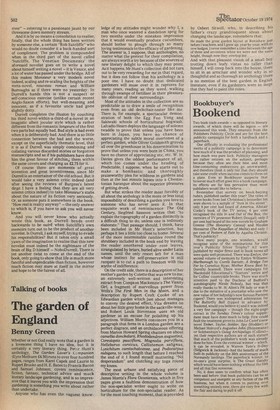Talking of books
The garden of England
Benny Green
Whether or not God really wots that a garden is a lovesome thing I have no idea, but it is certainly a very literary thing. Peter Hunt's anthology, The Garden Lover's Ccrnpanion (Eyre Methuen 50) runs to over four hundred pages, ranges from Karel Capek and Laurie to Rupert Brooke and H. E. Bates to Francis Bacon and Samuel Johnson; covers reminiscence, fiction, fantasy, technical advice and much literary landscape gardening; and is so impressive that it leaves you with the impression that gardening is something you write about rather • than undertake.
Anyone who has even the vaguest know
ledge of my attitudes might wonder why I, a man who once watered a dandelion sprig for two months under the mistaken impression that it would eventually produce cucumbers, should bother to plough through so many loving testimonials to the efficacy of gardening. The answer is, I suppose, that anthologies, no matter what the pretext for their compilation, are always worth a try because of the sources of new literary delight to which they may point.. As it happens, Mr Hunt's collection did not turn out to be very rewarding for me in that regard, but it does not follow that his anthology is a poor one. I have no doubt that dedicated gardeners will muse over it in raptures for many years, reading as they weed, walking through swamps of fertiliser in their pleasurable oblivion of their surroundings.
Most of the attitudes in the collection are so predictable as to draw a smile of recognition even from an old deckchair-tester like me. There is, for example, a spectacular demonstration of both the Egg Foo Yong and Sakiwaki schools of horticultural hogwash. Lafcadio Hearn deploys the language of solemn twaddle to prove that unless you have been born in Japan, you have no chance of appreciating the subtle moral overtones of a perfect garden, while Oliver Goldsmith grovels all over the greenhouse in his determination to prove that unless you were born in China, you have no chance of appreciating etc, etc. W. H. Davies gives the oddest performance of all, which too comes under the heading of Predictable, I suppose, when he starts out to make a bombastic and thoroughly praiseworthy plea for wildness in gardens and then at the last minute lapses into a Chestertonian harangue about the superior pleasures of getting drunk.
But what strikes the reader most forcibly of all about the anthology is the more or less total. impossibility of describing a garden you love to someone who has never seen it In that exquisite work of reminiscence The Old Century, Siegfried Sassoon writes that "to explain the topography of a garden distinctly is a difficult thing to do, unless one is tediously elaborate." That passage should, I think, have been included in Mr Hunt's selection, but perhaps it lies a little too close to home. Several of the more interminable rambles round the shrubbery included in the book end by leaving the reader smothered under rose leaves, strangulated by briars, buried alive under Latin names, until the only resort left for a man whose instinct for self-preservation is still rampant is to cut a path to freedom with the scythe of indifference.
On the credit side, there is a description of her mother's garden by Colette that was new to me; an extremely well-written and interesting extract from Compton Mackenzie's The Vanity Girl, a fragment of marvellous power from Wells's The First Men in the Moon, and a description by Rupert Croft Cooke of an Edwardian garden which just about manages to convey the desired effect. Vita dreams on about her little grey home in the sackville-west, and Robert Louis Stevenson uses an old gardener as an excuse for polishing up his adjectives. William Morris convinces you in a paragraph that ferns in a London garden are a perfect disgrace, and an orchidaceous offering from Marion Howard Spring chatters on about camellia doncleelarii, Rhododendron augustinii, Corvolopsis pauciflora, Magnolia parviflora, Helleborus corsicus, Callistemon salignus, Lysichitum camtschatcense, and Poc/ocarpus nubigens, to such length that before I reached the end of it I found myself muttering "Nil desperandum" and clutching my toga round -my knees. The most urbane and satisfying piece of descriptive writing in the whole volume is James Morris's Flora Oxoniensis, which in five pages gives a faultless demonstration of how the non-specialist writer ought to write on horticulture for the non-specialist reader. As for the most touching moment, that is provided
by Osbert Sitwell, who, in describing his father's crazy grandiloquent ideas about changing the landscape, remembers that:
He made the great garden layout at Renishaw just before I was born, and I grew up, year by year, with its yew hedges. I never remember a time between the age of three and seventeen when we were not the same height, though now they overtop me . . .
And with that pleasant vision of a small boy trotting down leafy vistas no taller than himself, I will creep back into the house, there to sit in an armchair and wonder why in so thoughtful and so thorough an anthology there is no mention of the best garden in English literature, even if its gardeners were so inept that they had to paint the roses.


































 Previous page
Previous page